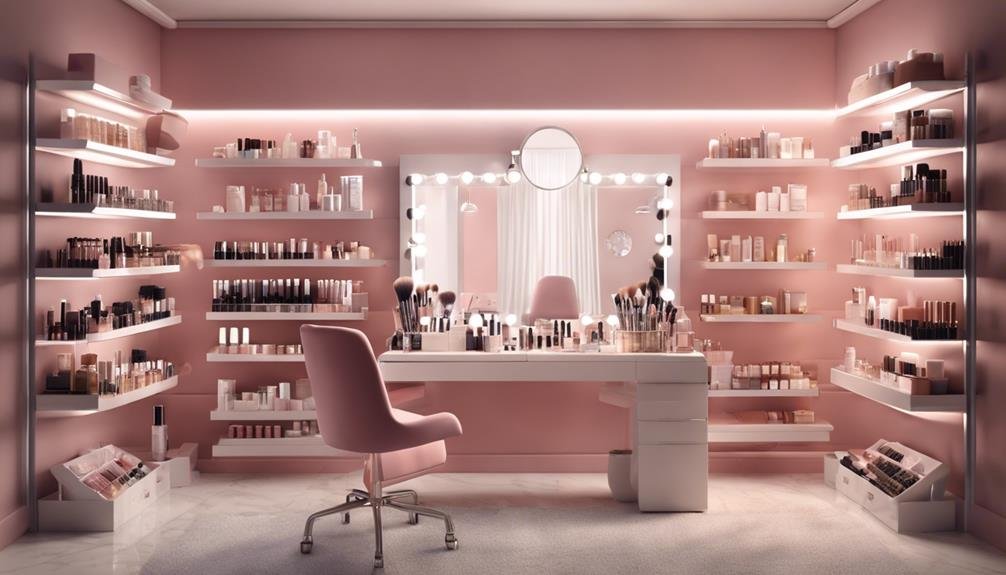How to Start a Business in Beauty
To start a beauty business, begin with thorough market research, identifying audience needs and analyzing competitors. Develop unique offerings and tailor marketing strategies effectively. Map out a strategic business plan with financial projections and identify your unique selling proposition. Guarantee legal compliance, choose the right business structure, secure trademarks, and protect your brand. Establish a strong branding strategy, invest in high-quality sourcing, engage online, and build a solid presence on social media. Utilize targeted marketing tactics, collaborate with influencers, and measure effectiveness. These steps lay the foundation for a successful beauty venture.
Key Takeaways
- Conduct market research to identify trends and target audience needs.
- Develop a unique selling proposition and branding strategy.
- Choose the right business structure and adhere to legal regulations.
- Source high-quality products and establish supplier relationships.
- Utilize online presence, social media, and marketing tactics effectively.
Market Research
Before diving into the beauty business world, conduct thorough market research to understand your target audience's needs and preferences. Identifying your target audience is essential in developing products and services that resonate with them.
Conducting competitor analysis will provide valuable insights into what similar businesses are offering and how you can differentiate yourself. By studying your competitors, you can identify gaps in the market that you can fill with unique offerings that cater to your target audience's specific needs.
Understanding your target audience's demographics, behavior, and preferences will help you tailor your marketing strategies effectively. Utilize tools like surveys, focus groups, and social media analytics to gather data on what appeals to your target audience.
Analyzing your competitors can also help you identify trends in the beauty industry and stay ahead of the competition. By combining insights from both target audience research and competitor analysis, you can develop a solid foundation for your beauty business that aligns with market demands and sets you apart from the competition.
Business Planning
Conducting thorough business planning is vital for mapping out the strategic framework of your beauty venture and ensuring its long-term success. When diving into business planning, start by delving into financial projections. Estimate your startup costs, ongoing expenses, and revenue projections to understand the financial feasibility of your beauty business. This step will help you set realistic financial goals and secure funding if needed.
Additionally, conducting a detailed target market analysis is essential. Identify your ideal customers, understand their needs and preferences, and analyze your competitors to find your unique selling proposition. By knowing your target market inside out, you can tailor your beauty products or services to meet their specific demands effectively.
Integrating financial projections and target market analysis into your business plan will provide you with a solid foundation for your beauty business.
Legal Considerations
Exploring the world of legal considerations is essential when launching your beauty business to guarantee compliance and protect your venture's interests. When diving into the legal aspects of your beauty business, two critical areas to focus on are business structure and regulations, as well as trademark protection and contracts. Ensuring you have the right business structure, whether it's a sole proprietorship, partnership, LLC, or corporation, is vital for tax implications and personal liability protection. Familiarize yourself with the regulations specific to the beauty industry to avoid any compliance issues that could jeopardize your business's success.
In the table below, you can find a concise overview of the key legal considerations you need to address when starting your beauty business:
| Legal Consideration | Description |
|---|---|
| Business Structure | Choose the appropriate entity type for your beauty business. |
| Regulations | Understand and adhere to industry-specific regulations. |
| Trademark Protection | Secure trademarks to safeguard your brand identity and products. |
| Contracts | Draft clear and detailed contracts for clients and suppliers. |
Branding Strategies
Crafting a strong branding strategy is vital for establishing a unique identity and building a loyal customer base for your beauty business. Your visual identity, including your logo, color scheme, and overall design, plays an essential role in how consumers perceive your brand. Make sure your visual elements align with the image you want to portray and resonate with your target audience.
Consistency in visual branding across all platforms, from your website to social media profiles, helps create a cohesive brand image that consumers can easily recognize and remember.
Consumer perception is influenced not only by your visual identity but also by the messaging and values your brand conveys. Define what sets your beauty business apart from competitors and communicate this effectively through your branding. Showcasing your unique selling points and brand story can help create an emotional connection with consumers, leading to increased brand loyalty and recognition.
Product Sourcing
To guarantee the quality and uniqueness of your beauty products, sourcing high-quality ingredients and materials is essential. Supplier relationships play a significant role in ensuring a steady supply of excellent components for your products. Establishing strong connections with reliable suppliers can help you maintain consistency in the quality of your offerings.
Conducting regular quality control checks is vital to uphold the standards of your beauty products. Implementing stringent quality control measures throughout the sourcing process can help prevent any issues with the final products.
Cost analysis is another critical aspect of product sourcing. Evaluating the expenses associated with sourcing ingredients and materials can help you make informed decisions to optimize your budget. By conducting thorough cost analyses, you can identify areas where you can potentially reduce expenses without compromising on quality.
Packaging design is also an integral part of product sourcing. Investing in attractive and functional packaging can enhance the overall appeal of your beauty products. Consider factors like branding, convenience, and sustainability when designing the packaging for your products.
A well-thought-out packaging design can set your products apart in a competitive market.
Online Presence
Establishing a strong online presence is crucial for the success of your beauty business in today's digital landscape. To guarantee your brand stands out and thrives online, consider the following key strategies:
- Active Social Media Engagement: Engage with your audience on platforms like Instagram, Facebook, and TikTok. Share compelling visuals, behind-the-scenes glimpses, and user-generated content to foster a sense of community around your brand.
- Influencer Partnerships: Collaborate with influencers in the beauty industry to reach a wider audience and gain credibility. Look for influencers whose values align with your brand and whose followers match your target demographic.
- Consistent Branding: Maintain a cohesive brand image across all online channels, from your website to social media profiles. Consistency helps build brand recognition and trust among consumers.
- Interactive Content: Create interactive content such as polls, quizzes, and live streams to keep your audience engaged and foster a two-way conversation. This approach can help increase brand loyalty and drive sales.
Marketing Tactics
Utilize targeted advertising campaigns to reach your ideal audience and drive engagement for your beauty business. When it comes to marketing tactics, leveraging social media platforms is vital for connecting with your target market. Establish a strong presence on platforms like Instagram, Facebook, and TikTok to showcase your products, engage with customers, and build brand awareness.
In addition to social media, consider partnering with influencers in the beauty industry to expand your reach. Collaborating with influencers who align with your brand can help you tap into their loyal following and gain credibility with potential customers. Make sure that your partnerships feel authentic and resonate with your audience to maximize the impact of influencer marketing.
To better understand the effectiveness of your marketing efforts, track metrics such as engagement rates, website traffic from social media, and conversions. Analyzing these data points will enable you to refine your strategies and optimize your marketing campaigns for better results.
| Marketing Tactics | Description | Benefits |
|---|---|---|
| Social Media | Utilize platforms like Instagram, Facebook, and TikTok | Connect with target audience |
| Influencer Partnerships | Collaborate with industry influencers | Expand reach and gain credibility |
Frequently Asked Questions
How Can I Stay Motivated During the Challenging Early Stages of My Beauty Business?
To stay motivated during the early stages of your beauty business, focus on mindset tips like setting small goals, prioritize self-care practices, utilize motivation techniques such as positive affirmations, and build support systems through networking and mentorship.
What Strategies Can I Use to Build a Loyal Customer Base in the Competitive Beauty Industry?
To build a loyal customer base in the beauty industry, focus on personalized interactions. Use targeted marketing strategies to engage with customers authentically. Building trust is key; offer exclusive deals, share beauty tips, and show appreciation.
How Do I Effectively Manage Inventory and Avoid Overstocking or Running Out of Popular Products?
To effectively manage inventory, focus on optimization through demand planning and supply chain management. Utilize forecasting tools to anticipate popular products. Avoid overstocking by adjusting orders based on trends. Keep your inventory lean and responsive to customer needs.
What Are Some Creative Ways to Differentiate My Beauty Business From Competitors?
To stand out in the beauty biz, focus on unique branding that captivates your audience. Offer specialized services that cater to specific needs. Embrace innovation, like personalized consultations or eco-friendly products, to set your business apart.
How Can I Handle Negative Feedback or Reviews Gracefully and Turn Them Into Opportunities for Improvement?
When receiving negative feedback, respond constructively by acknowledging the concerns, offering solutions, and showing appreciation for the input. Turning criticism into growth opportunities can help you refine your business, build credibility, and enhance customer relationships.
Conclusion
To sum up, starting a business in the beauty industry may seem like a piece of cake, but it requires careful planning and strategic execution.
Remember, Rome wasn't built in a day, so take your time to research, plan, and launch your beauty business successfully.
With the right branding, product sourcing, and marketing tactics, you'll be on the path to success in no time.
So go ahead, seize the day and make your beauty business dreams a reality!







